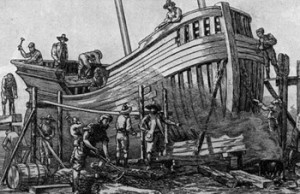Squanto
It always feels odd to take a long trip only to find English-speakers in the remotest places. It is relatively easy to do, of course, with the recent spread of the language, to the point that it is sometimes too easy to be lazy and expect it. Imagine if people had always done this? Imagine if the pilgrims had sailed the Mayflower across the Atlantic to land in what is now the USA, and expected to find a waiting village that was empty of all but one English-speaker, ready to translate.
They did. Squanto, the last member of the Patuxet tribe at what is now Plymouth. It is not that he idly picked up English from a few random visitors – he had lived in London. Twice. He was first taken from his home in 1614 by slave traders but freed by friars in Southern Spain. From Spain, he traveled across Europe at the time that Galileo was first demonstrating his telescope. He arrived in London, living there during the height the Scientific Revolution. He was not the only Native American in London at the time, or even the most well-known: Pocahontas was in London at that time too, and was also trying to find passage home, only to die of smallpox as she was preparing her trip back (her son would make it). He would have also been in London during the final years of Shakespeare’s life. The world seemed bigger back then, but perhaps not as big as we sometimes imagine.
Squanto’s first trip back to America took him to Newfoundland (in what is now Canada), but it proved impossible to organize a trip home down the coast. He returned all the way to London. He eventually made it back in 1619, just over 5 years after he was kidnapped. He is thought to have missed the decimation of his village by disease by just one year.
When the pilgrims arrived a year later it must have been strange for him to see his empty village repopulated by people from the land that he had worked so hard to leave, and then to watch half of them quickly die of disease. Perhaps it was watching them suffer in the same place as his own people must have suffered, and in much the same way, that gave him the compassion to help. He taught the pilgrims to farm and fish, and acted as translator.

The only pictures I could find of Squanto were of him planting maize for others, translating, or otherwise serving someone. Here is a picture of him (or someone like him) building the most modern technology of its day.
Is it a coincidence that the most famous early European settlement in America relied on an English-speaker who knew the land and people? No. The majority of the European settlements in America at that time did not survive. People mostly starved, died of disease or returned. The reason we know about it at all was because he was there. It is not that there were only a few settlements – there were many. We only remember this surviving one because they had the English speaker that allowed them to survive and tell their story.
It is the same when I look back and marvel at how many English-speakers I have met in remote places. It is not that there were so many – just that I remembered the people I spoke to more than I remembered the countless others I passed who did not. I don’t think people will start toasting Squanto at thanksgiving, but I’ll remember my ‘Squanto fallacy’ the next time that I am getting away with speaking some language far from where it started.